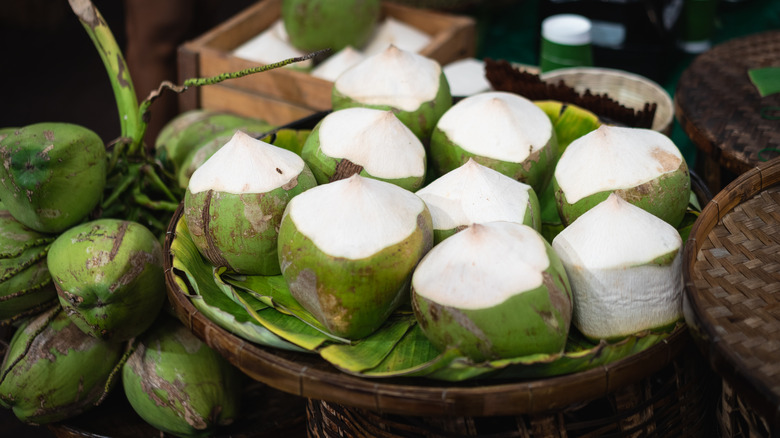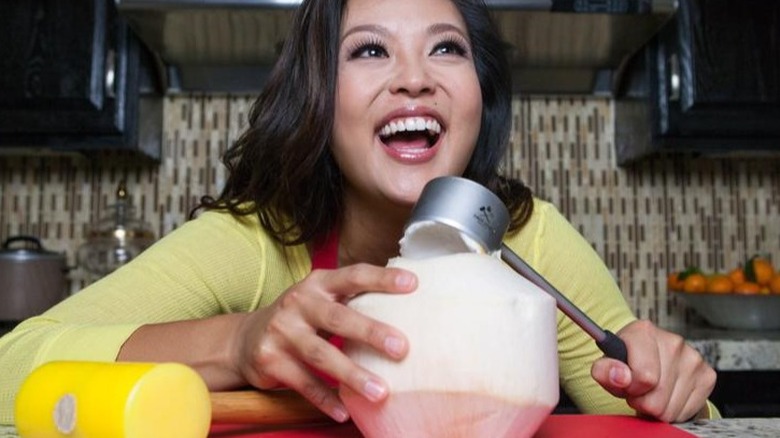Where Is Coco Jack From Shark Tank Today?
Coconut is a tasty, wholesome fruit that provides much nutritional value. Coconut contains fiber, protein, minerals, and medium-chain fatty acids. This healthy form of saturated fat helps burn calories more efficiently and improves endurance during physical activities, as it's easier for the body to digest than fats derived from animals. Medium-chain fatty acids are also associated with a reduced risk of tooth decay and gum disease thanks to their antimicrobial effects.
Thai coconuts, which are a young form of the fruit that is served sans husk, are particularly flavorful while also brimming with essential nutrients. However, opening Thai coconuts proves challenging for most people. The process entails making several cuts to the top of the fruit using a sharp cleaver, which creates an opening to access the interior. From there, you can stick a straw into the opening to enjoy the delicious coconut water inside. If you want to access the flesh of the fruit, you must make even more cuts around the side of the coconut to scrape it out. Along with being inconvenient, opening Thai coconuts can easily cause injuries. That's why an industrious inventor decided to develop a better method.
A finger-saving method of opening coconuts
Dave Goodman and his company Coco Jack appeared on "Shark Tank" Episode 21 during the 6th season of the reality show. Coco Jack consists of a metal tool with a circular opening that's placed on top of the coconut. A mallet is used to pound the tool into the flesh, which creates an opening to access the water inside. The Coco Jack pack also comes with a tool to easily remove the flesh of the fruit. Goodman explains he was inspired after beginning a raw vegan diet and finding coconuts challenging to open. Goodman requests $125,000 in exchange for 10 percent of Coco Jack during his appearance.
Robert Herjavec and Mark Cuban try out the device, and both are successful when using it. However, many of the Sharks are put off by Goodman's eclectic history, as they worry that he may not have the focus needed to launch a product. Despite $325,000 in profits over nine months, Barbara Corcoran questions Goodman's organizational skills and subsequently goes out. Citing his childhood in Cambodia, where Thai coconuts were all the rage, Kevin O'Leary offers $125,000 for 50 percent of the company. Mark Cuban also makes an offer in the form of a $125,000 investment structured as convertible debt with a 7 percent interest rate. If the product makes money, the debt is converted into 25 percent equity. After briefly considering, Goodman accepts Cuban's offer and leaves the pitch room with a deal.
Competing products made Coco Jack a hard sell
Despite successfully striking a deal on "Shark Tank," there's no indication that Cuban ever invested in Coco Jack. A visit to the company's website finds it now defunct. Similarly, the product is not available on Amazon, although there are lots of other coconut-opening products available from competitors. For instance, one set of tools looks incredibly similar to Coco Jack, albeit at a much lower price point. As Goodman revealed during his appearance, Coco Jack retailed for approximately $60, which could be one reason why the admittedly helpful product failed to land a foothold among the target market.
As for Coco Jack's social media presence, the product's Twitter account appears to have been suspended for a violation. And while the Facebook page is still up and running, it hasn't been updated since September 2017. As it stands now, it appears that the Sharks' concerns about Coco Jack's inventor may have been well-founded, despite how useful and effective his invention was.


